- Home
- Virginia Kantra
Sea Lord Page 3
Sea Lord Read online
Page 3
Regina stuck out her chin. “Maybe he has other responsibilities now.”
“Then I should have been informed.”
Dylan took Regina’s hand and pulled her to his side. “Regina is to be my wife.”
“Ah.” Conn’s gaze, light as frost, surveyed her face; dropped briefly to her belly. “Congratulations. You will want this, then.”
He slipped a silver chain from under his shirt and around his neck, and laid it on the glass display case.
Lucy heard the clink of metal and felt a buzzing in her head like a hive of bees. Her fingertips tingled.
Through the swarming in her head, she saw Caleb step closer to the counter. “What is it?” he asked.
“A warden’s mark,” Margred breathed.
A what?
“A wedding present,” Conn said at the same time.
Dylan’s face went from red to white. Whatever it was, Lucy thought, her brother wanted it very badly. She blinked, trying to clear the cloud from her eyes, to quiet the hum inside her.
Caleb rocked back on his heels and shot him a challenging glance. “A present? Or a bribe?”
Conn’s mouth became a hard, flat line. “You underestimate the gift. And your brother.”
“Say, instead, that my husband does not underestimate you,” Margred murmured. “The timing—”
“Dylan earned this.”
Forgotten in her corner, Lucy wondered, Earned what? Earned it how?
She squinted at the object on the counter, a flat silver disk engraved with swirling lines that looked a lot like Regina’s tattoo: three flowing, connected spirals bound in a circle. The pattern pulled at her, coiling, dangerous, mesmerizing as a snake. Staring at it, she felt her head fill with bees, her bones turn to sand.
Deep breaths, she told herself, and held everything still inside her until the dizziness passed.
Dylan raised his gaze from the medallion to Conn’s face. “I cannot accept it,” he said jerkily.
“I have never known you to be stupid before,” Conn said. “I can feel your influence all over this island. You are a warden now, whether you wear the mark or not. Take it.”
Dylan shook his head. “My loyalty is pledged elsewhere. To them.”
“Them,” Conn repeated, testing the word in his mouth.
Dylan tightened his hold on Regina’s hand. “My family.”
His new family, Lucy thought, watching unobtrusively from the shelter of the booths. Which was the way it should be. But his gesture did not make her feel any less alone.
“Yes.” Conn’s pale gaze sought Lucy in her corner. She trembled, pinned. Dismayed. Disconcerted that he had noticed her, when her brothers and her friends had forgotten she was there. “Let us discuss your family.”
“We can’t now,” Regina objected. “I need to get back to work. Dinner service starts in less than an hour.”
“I do not believe your participation is required in this discussion,” Conn said coldly.
“That’s because you don’t know me very well.”
Lucy bit down on a smile.
“We’re all in this together,” Caleb said firmly. “Except for Lucy, of course.”
Lucy’s smile died. Of course.
“Caleb.” Margred touched his arm again, nodding to where Lucy stood, frozen in her corner.
Her family turned to look at her with varying degrees of concern, regret, surprise.
She cringed inside, feeling the veil she had drawn around herself thin to cobweb.
Strangely, it was Conn who rescued her.
“Then we must postpone our discussion until you all are available,” he said. “Tonight. At your house.”
Dylan and Regina exchanged glances.
“Ma is closing tonight. I can ask her to watch Nick,” she said, referring to her eight-year-old son.
Dylan nodded.
“We’ll be there,” Caleb said. “Eight o’clock?”
“Eight.” Conn’s cool, opaque gaze rested a moment longer on Lucy.
She felt again that dangerous quiver, that liquid tug deep in her belly, and stared at her feet.
Go away, she thought fiercely. Please, just . . . go away.
After a long moment, the bell jangled. The door closed behind him.
Regina’s cheeks puffed out. “Well.”
Margred’s smooth forehead creased.
Caleb rubbed the back of his neck. “Listen, Lu—”
“I’m fine,” she assured him quickly.
And she would be. As soon as she could be alone. As soon as she could pull herself together, repair the chinks in the careful wall she’d built around herself and her emotions.
“I’ll see you all later. Or, um, not,” she said and edged toward the door.
“It’s not you,” Dylan said. She was sure he meant to be kind. “This doesn’t have anything to do with you.”
She managed to find a smile from somewhere and fixed it on her mouth. “Right.”
She didn’t know what was going on. She didn’t know why she was excluded, even in her own family. Why she was different.
Her hand trembled as she reached for the door. She yanked on the handle, desperate to escape before the emotion seething inside her found its way through the cracks.
She climbed the road toward home, hugging her sweatshirt and her composure against the fog rolling in from the sea. Like Dylan said, Conn’s visit didn’t have anything to do with her.
And yet . . .
She reached the top of the hill. The last light spilled through a tear in the sky, daubing the waters of the harbor red and gold. The breeze that plucked her hair carried the scent of salt and the cries of the gulls. For one moment, Lucy lifted her face to the wind and let herself breathe, let herself dream, let herself yearn.
Then she set her steps inland, toward the dark spires of spruce and the white church tower rising from the streaks of fog. Going home. Alone.
A bird mourned in the trees.
Her heart pounded.
Without turning her head, she knew when Conn came out of the mist to fall into step beside her.
2
SHE DID NOT JUMP OR SCREECH.
Conn supposed he should be grateful for that. She either was brave or particularly unexcitable. A lioness? he wondered. Or a sheep? Either suited his purpose.
They walked together in silence under the lengthening shadow of the trees. The air swirled with moisture and the scent of pine. Mist sheened the black road and collected like a veil of pearls on the girl’s fair hair. She walked with long strides like a man’s, her arms crossed tightly in front of her. She did not look at him.
Conn had thought that she was shy. He wondered now if she was actually guarded. There was a stillness in her that did not feel completely natural, a watchfulness he recognized, almost like the discipline he had learned to impose on himself when he came to rule.
Which was absurd. She was too young to have learned such control, too human to need it.
He did not know what to say to her.
Her brother Dylan was selkie. Her brother Caleb had married one. It was clear to Conn, however, that her family had told her nothing. Why should they? The recent trouble between the children of the sea and their fellow elementals, the children of fire, had nothing to do with her.
Yet the vision of her face had dragged him from his tower and drawn him halfway across the world. He eyed her almost resentfully.
“I thought you were talking to everybody later. At the house,” she said to her feet. Long, narrow feet, he noticed, in shoes that might once have been white.
“I am.” He clasped his hands behind his back. “I am talking to you now.”
She turned her head. “Why?”
Such directness was unexpected and somewhat disconcerting.
“I would like to get to know you better,” Conn said carefully.
“Why?” she repeated, nettling him.
Conn was not used to accounting for his actions. Even his wardens did not question him. He could har
dly tell her he was trying to figure out what possible use or interest she could be to him. “I cannot be the first man to seek your company.”
She smiled crookedly. “Yeah, I have to beat them off with a stick.”
He stared. He could not have heard her correctly. “I beg your pardon?”
Pink suffused her lean face. “I meant . . . It’s been a while.”
Could he turn that to his advantage? Did human females want sex, miss sex, as selkies did?
“How long is a while?”
She blinked. “Boy, you take this getting-to-know-you shit seriously, don’t you?”
“You do not have a husband?” he pressed. “A suitor?”
“You mean a boyfriend?”
Was that the word?
“Yes.”
Her shoulders hunched, almost hiding her ears. “Nope.”
Conn was aware of a faint release of tension. The claims or existence of another sexual partner meant nothing to him, but they might matter to her.
He was glad she was not married.
Her shoes scuffed the wet, black road. “What about you?” she asked.
“I live alone,” he said truthfully. Selkies did mate, but few pairings lasted through the centuries.
“No one special?”
“Not for some time. My, uh, work does not permit many distractions.”
“What kind of work do you do?”
“You ask a great many questions.”
A smile lit her narrow face. “I work with five- to seven-year-olds. Taking an interest is part of my job description.”
He stared. “You are a teacher.”
He had once gone to great lengths to secure a teacher for the half-grown, half-feral whelps of Sanctuary. But there were no children on the selkie island anymore. Not in over twenty years. Dylan had been the last.
Conn’s people were dying out. He needed more than a teacher to save them this time.
“You have a problem with teachers?”
“Not at all,” he said politely. “I admire those who can teach. I simply have not known many.”
“You must have known some.”
He raised his eyebrows in question.
“When you were a kid,” she explained.
“Ah. No. I received instruction—what there was of it—from my father.”
She nodded. “Homeschooler. We don’t get a lot of those on World’s End. Most islanders are just grateful we have enough children to keep the school running, you know?”
“Indeed.”
“Did you like learning from your father? Or was it lonely without other children?”
Conn frowned. It was not the sort of question anyone had ever asked him. That anyone would dare to ask him. He did not talk about himself or what he missed or what he liked. He especially did not talk about his father.
He looked down grimly at the woman walking beside him with long, free strides. Now that the conversation was fixed on him, she was animated, even attractive, her quiet face bright with encouragement.
It was her job, she had said, to take an interest. He thought it must be her nature as well.
But then why did she shrink into herself earlier? Was she so averse to attention? She had a trick of lowering her lashes and ducking her head that made her almost disappear.
Like magic.
Not magic, Conn reminded himself. She was human. She could have no understanding of him or his needs.
“I am never lonely,” he said.
“You and your father must be close, then,” she observed.
“Not particularly,” Conn said, his tone cool.
Her soft green eyes reflected her confusion. “But if he taught you—”
“I have not seen my father for many years.” Centuries, if he kept track of such things. Which he certainly did not. “He abandoned all claim to affection or allegiance”—or the throne—“when he abandoned us.”
“ ‘Us’?” she queried softly.
Conn regarded her with annoyance. “My people.”
“Your family.”
He was silent.
“It’s hard,” she said. “Dealing with a parent who walks out. I mean, I miss my mother, and I don’t even remember her. She left us when I was a baby.”
Conn frowned. Was she actually offering him sympathy? He was selkie, one of the First Creation. He did not require her pity. “So I heard.”
She turned her head sharply.
“From your brother,” he said.
Her brow cleared. “That’s right. Have you known each other long?”
Ever since Dylan’s Change at thirteen, when Atargatis discovered her older son was selkie. She had returned with him to the sea, leaving her human family behind.
A year later, she was dead, trapped and drowned in a fisherman’s net, and Dylan became Conn’s ward on Sanctuary.
“Long enough,” Conn said.
Fog dripped from the trees like tears. The houses grew smaller and farther apart. Rusting vehicles and stacks of lobster traps littered yards like wrecks on the ocean bottom.
“Did you ever meet her?” Lucy asked abruptly. “My mother?”
“Yes.”
“What was she like?”
Discontented, Conn remembered. As unhappy with the life she had returned to as the one she left. Away from the magic of Sanctuary, in human form, selkies aged as humans did. The years on land had dragged at Atargatis, coarsening her hair, wearing on her spirit, etching lines at the corners of her eyes. But she was still selkie, still alluring, still . . .
“Beautiful,” he said.
“That’s it? Just beautiful?”
What did she want him to say? She was not like the mother who had abandoned her. Not selkie. And not beautiful either. Appealing, perhaps, with her lean, quiet face and coltish grace, but . . .
“Beautiful and sad,” Conn said. “Perhaps she regretted leaving you.”
“Maybe,” the girl said doubtfully.
“You could ask your brother.”
“After twenty-three years?” Unexpected humor lit her eyes. “I don’t think so.”
“Your father, then.”
“We don’t talk about her.” Her shoulders were rigid. She stared straight ahead at the darkening road. “We don’t talk about much of anything, really.”
She was guarded, Conn thought. More comfortable asking questions of him than offering anything of herself.
He remembered the way she stood apart at the restaurant, an observer in her own family.
Isolated.
And vulnerable.
He could use that, he thought.
“You can talk to me,” he said.
Lucy unlocked the front door, uncomfortably aware of Conn on the porch behind her. Her palms sweat. Her stomach jittered. For a moment, she was catapulted back to fifth grade, afraid to bring a friend home after school.
The door creaked open. “Dad?”
No answer.
Her stomach relaxed.
The reassuring aroma of the beef and vegetables she’d dumped into the Crock-Pot that morning rushed to greet her, almost masking the smells of must and old carpet.
Lucy had come home from college with a bucket of cleaning supplies and a guide to keeping house, as if spotless tile would bring sparkle to their lives, as if she could banish bad memories along with the dust.
Maybe her efforts could not make up for the years of disorder and neglect, for the cracked vinyl and the cramped spaces and the mildew that sprouted mysteriously at the bottom of the stairs. At least her floors were clean.
Conn followed her as she marched past the shadowy living room, flipping on light switches as she went. He stood in the middle of her scrubbed kitchen floor, overdressed, out-of-place, dark, and wild. Her heart thundered. She felt breathless, as if he’d done his sucking-all-the-oxygen-out-of-the-room trick again.
And yet he did not move, only stood there with his hands still clasped behind his back.
“Where is your father?” he asked.
She grabbed a spoon and lifted the lid of the Crock-Pot, hoping he wouldn’t notice her hot cheeks. “Out,” she said, stirring.
Conn glanced at the now-dark windows. “It is late to haul traps.”
He knew her dad was a lobsterman. Lucy’s hand tightened on the spoon. What else did he know?
“My father’s on the water by five every morning. In by four, most days. He off-loads and does his business at the co-op.” She set her spoon on the counter, pleased that neither her hand nor her voice trembled. “And then he goes to the bar at the inn and drinks until they won’t serve him anymore.”
She fit the lid carefully back on the pot and turned to face Conn, her back to the counter, her chin high. “Are you hungry?”
A short, charged silence vibrated between them.
Conn studied her face, his silver eyes inscrutable. “Yes. Thank you. That smells very good.”
She almost sagged with relief and disappointment.
What had she expected?
That he would say he was sorry for her, for her alcoholic father, her crappy childhood?
That he would sweep her off her feet and take her away like a prince in a fairy tale?
Stupid, stupid. She wasn’t looking for sympathy. Or rescue. Especially not from some cold-eyed stranger who twisted her insides into knots.
What a good thing he hadn’t offered either one.
“Sit down,” she said. “I’ll get you a plate.”
His eyebrows raised. “You must join me.”
Not, “Would you join me?” Not a question or a request. Obviously, he expected her to sit down and put a good face on things and pretend that everything was normal.
Lucy bit her lower lip. And she would, too.
Because she always did.
Conn generally paid scant attention to what he ate or did not eat. But hot food was a change from his usual raw diet. The simple stew had stirred his appetite.
He watched the girl—Lucy—as she cleared the table and washed their few dishes. In her own venue, she was really quite competent. He observed the neat, practiced movements of her hands as she rinsed a plate and set it on the counter to drain. Narrow, brown hands, with long, slender fingers and strong wrists.
She stirred his appetite, too.
Conn frowned. He was revising his opinion of her attractiveness. He still did not understand what he was doing here.

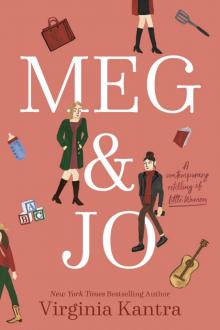 Meg and Jo
Meg and Jo All a Man Can Do
All a Man Can Do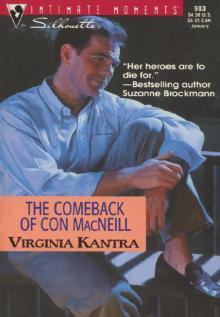 THE COMEBACK OF CON MACNEILL
THE COMEBACK OF CON MACNEILL All a Man Can Be
All a Man Can Be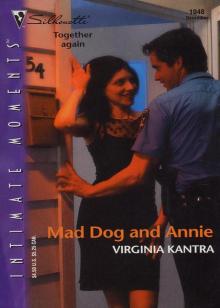 MAD DOG AND ANNIE
MAD DOG AND ANNIE![Dare Island [2] Carolina Girl Read online](http://i1.bookreadfree.com/i/03/26/dare_island_2_carolina_girl_preview.jpg) Dare Island [2] Carolina Girl
Dare Island [2] Carolina Girl Forgotten Sea
Forgotten Sea Sea Lord
Sea Lord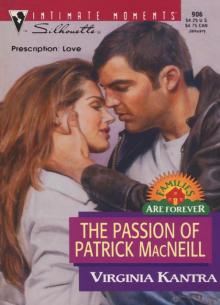 THE PASSION OF PARICK MACNEILL
THE PASSION OF PARICK MACNEILL All a Man Can Ask
All a Man Can Ask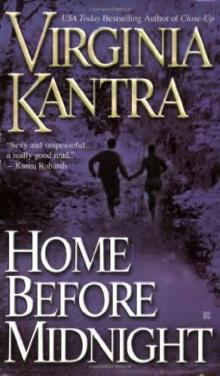 Home Before Midnight
Home Before Midnight Family Secrets: Books 5-8
Family Secrets: Books 5-8 Carolina Dreaming: A Dare Island Novel
Carolina Dreaming: A Dare Island Novel Carolina Home
Carolina Home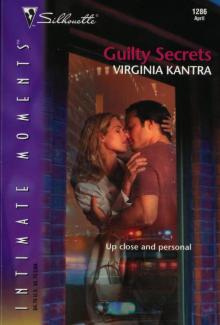 GUILTY SECRETS
GUILTY SECRETS Carolina Blues
Carolina Blues Carolina Man
Carolina Man Carolina Man (A Dare Island Novel)
Carolina Man (A Dare Island Novel) STOLEN MEMORY
STOLEN MEMORY Carolina Heart
Carolina Heart Immortal Sea
Immortal Sea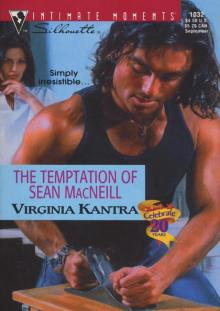 THE TEMPTATION OF SEAN MCNEILL
THE TEMPTATION OF SEAN MCNEILL Sea Fever
Sea Fever